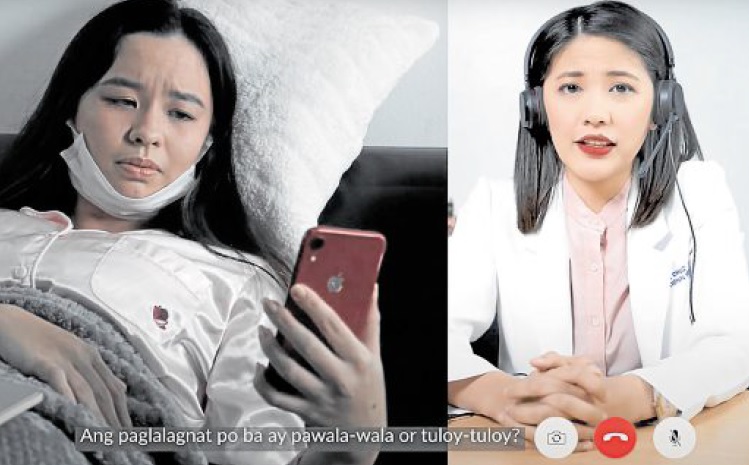No need to leave the house to consult a doctor
There are a lot of valid questions about the longevity of any digital pivot that came to the fore during the pandemic.
For many of these initiatives meant to respond to the needs of greater health and safety requirements, the inevitable issue their proponents have to address is whether the demand for these new ways of doing things—often done with the help of technology to reduce the need for face-to-face interaction—will still be needed once the COVID-19 crisis ends.
For Cholo Tagaysay, who heads telemedicine provider KonsultaMD, the answer is an unequivocal yes.
To buttress this, the technology executive told the story of his mother who used her iPhone for nothing more than calling and texting before the pandemic.
But once the lockdown in early 2020 turned everyone’s world upside down, she quickly learned about the immense possibilities that her smartphone opened up to her. His mother now uses her mobile phone for many other services in addition to communicating, like entertainment, information, shopping and, of course, telemedicine.
Article continues after this advertisement“Our situation has taken away the reluctance of many Filipinos to try telehealth services,” Tagaysay said at an online briefing. “People are looking for ways to stay safe from the virus while our hospitals are overwhelmed with patients. KonsultaMD has become a platform that connects Filipinos to much-needed medical consults for nonemergency cases.”
Article continues after this advertisementDizzying growth
Less than two years into the global health crisis, medical consultations through the KonsultaMD app skyrocketed by 1,549 percent versus prepandemic levels.
Likewise, the service has reached over one million members who enjoy 24/7 unlimited access to licensed doctors via voice or video call for as low as P60 a month.
Tagaysay is confident that even after the pandemic, the behavior of consulting with a doctor via voice or video will remain if the current trend is an indication. He noted that even when COVID-19 cases subsided early this year, teleconsults continued to grow as people realized the advantages of using the service and going digital.
Aside from being affordable, safe and convenient, teleconsultation encourages the practice of raising medical concerns while they are still at an early stage instead of waiting until the condition worsens.
KonsultaMD members can consult with doctors specializing in different fields, from general medicine, family medicine, obstetrics and gynecology, pediatrics, rehabilitation medicine, mental health support (counseling and psychotherapy), psychiatry, dermatology, ophthalmology, dentistry, EENT (eye, ear,nose, throat) and surgery.
Likewise, KonsultaMD provides digital management of health consultation records and issuance of medical documents such as e-prescriptions, e-laboratory requests, e-referrals and e-medical certificates.
Blue Ocean
The excitement over the possibilities of KonsultaMD is shared by Globe Telecom’s 917Ventures, whose startup investment portfolio the telemedicine firm belongs.
In fact, KonsultaMD could follow the footsteps of sister company Mynt—which owns the ubiquitous GCash mobile wallet (which now has a “double-unicorn” status)—in the coming years, if its leaders are to be believed.
“We’ve had high hopes for KonsultaMD even before the pandemic,” 917Ventures managing director Vince Yamat said. “We saw it as a way to address the pain points in Philippine health care, which was suffering from a lack of health- care professionals, inadequate health infrastructure and limited accessibility, not to mention the high cost of medical consultation.”
“People were wary of using the service before as they are used to traditional face-to-face consultations, but with the pandemic, things have changed,” he added. “Telehealth has become an important innovation that will stay and evolve.”
917Ventures, as Globe’s corporate venture builder, plays a significant role in the company’s journey to becoming a digital solutions group.
Next week, it is set to participate in the Philippine Startup Week to share learnings and developments. It is also looking for talents and startups who may want to be part of the country’s biggest corporate venture builder.
Aside from GCash and KonsultaMD, other portfolio companies under 917Ventures are online grocery shopping platform Purego, loyalty and e-commerce solution RUSH, end-to-end digital advertising agency AdSpark, primary care aggregator HealthNow, multichannel communication services m360, and self-service AI-powered merchant dashboard Inquiro. 917Ventures also has investments in online learning platform Edventure, fan marketplace Fanlife, online IT bootcamp KodeGo, and online seller platform BentaTV.
But right now, all eyes are on KonsultaMD and Tagaysay hopes that, just like GCash, patients who get to experience the convenience of telemedicine will stick around even after the pandemic ends.
“If you’ve experienced something that is cheaper, more convenient, more efficient, and something that works, will you still go back to the old way of doing things?” he said.
He has a good point. And a good product.
